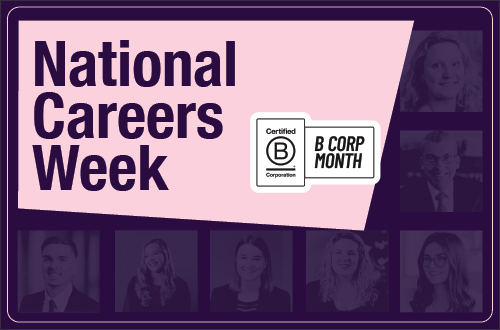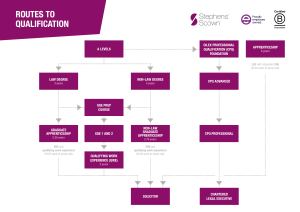
For anyone looking to make their way into the legal sector, the options available to forge a career are broader and more accessible than ever. Whatever stage you’re at, there’s a path to help you achieve your goal. With the UK focused on supporting young people to reach their potential as part of Careers Week 2024 (4-8 March), Molly Ripley and Lexie Williams take you through the different routes to law.
The ‘Old’ Route: Legal Practice Course (LPC)
For those who started their law degree, or Graduate Diploma in Law (GDL) before September 2021, the traditional LPC route remains available. Candidates must have a law degree or equivalent (i.e. a GDL) to sit the LPC. The course is one year long and trainees with the firm will usually undertake their LPC with the University of Law.
For those without a law degree, they will need to sit a one-year law conversion course.
After completing the LPC, candidates then undertake a formal two-year training contract where they will complete four, six-month long seats in a variety of teams. After those two years, candidates then reach qualification as a solicitor.
Route Post September 2021
The new Solicitors Qualifying Examination (SQE) route consists of two exams – SQE 1 tests students’ functional legal knowledge and SQE 2 is tested on the practical legal skills required for practice.
The SQE preparatory course is strongly recommended for all students before sitting SQE 1 and 2, however non-law students will have to study a preparatory course or law conversion course before sitting SQE 1. The qualifying work experience (QWE) can be undertaken at any time, but the firm’s policy is that it will be undertaken via a structure akin to a training contract after both SQE 1 and 2 exams have been passed.
At the end of the QWE (if sat after both exams) candidates then reach qualification as a solicitor.
Graduate Apprenticeship
Graduate Apprenticeships are open to both law and non-law graduates, the firm currently uses the University of Law to deliver these programmes. Candidates must have a UK bachelor’s degree at 2.2 or above and have GCSE English and Maths at Level C/4. The apprenticeship programme runs for 33 months for non-law graduates or 27 months for law graduates and prepares candidates to sit SQE1 and SQE2. Candidates will work four days a week and have one ‘off the job’ day to study for the SQE exams. All candidates will have a skills assessor provided by the University who will help candidates develop a work-based portfolio. Candidates will sit with one team for a year and then complete four, six-month long seats in a variety of teams.
Once SQE2 has been passed and the firm has signed off QWE, candidates reach qualification as a solicitor.
Non-Graduate Apprenticeship
The non-graduate apprenticeship is open to any school leaver who has obtained three A Levels at Grade C or above and five GCSES at Grade C/4 or above, including Maths and English. Over the course of the six-year apprenticeship, candidates will complete the LLB, have the option to undertake a LLM and sit SQE1 and SQE2. The firm uses the University of Law to deliver the solicitor apprenticeship programme. Candidates will work four days a week and then spend one day a week studying. All candidates will have a skills assessor provided by the University of Law, who will meet with them once every quarter to check that they are developing the skills required to become a day one solicitor. Apprentices will sit with one team until they reach the fifth year of their apprenticeship. They will then merge with the training contract candidates and undertake four, six-month long seats in a variety of teams.
Once SQE2 has been passed and the firm has signed off the QWE, candidates reach qualification as a solicitor.
CILEX Route
School leavers/non-law graduates start with the CILEX Professional Qualification (CPQ) Foundation (12-18 months) and earn a CILEX Diploma in Law and can qualify as a CILEX paralegal. Or candidates can progress onto CPQ Advanced which is suitable for law graduates and is a further 12-18 months of studying. Candidates can they qualify as a CILEX Advanced Paralegal or continue to study the CQP Professional (12 months). After the CPQ Professional course has been passed, candidates qualify as a CILEX Lawyer.
It is also possible to complete the CILEX route as an apprenticeship.
If you are interested in any of the available routes into law, please contact Rachael Smith, the Graduate Recruitment & Apprenticeships Officer, at R.Smith@Stephens-Scown.co.uk

